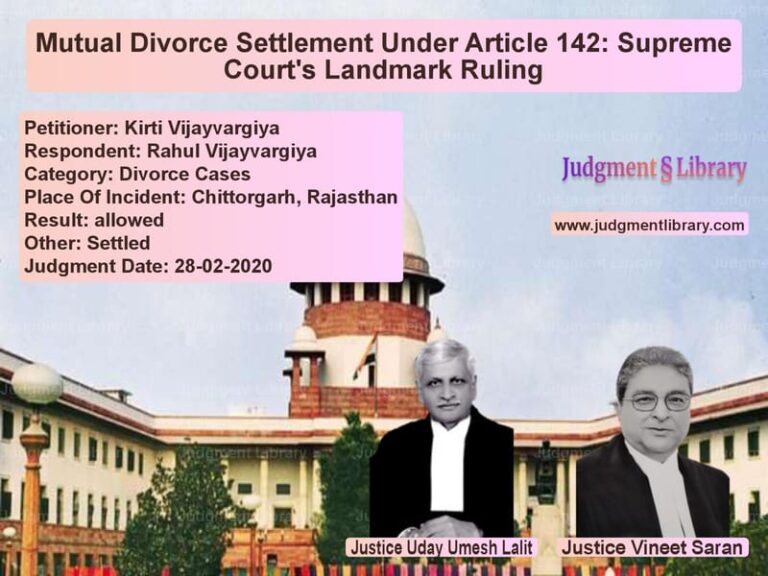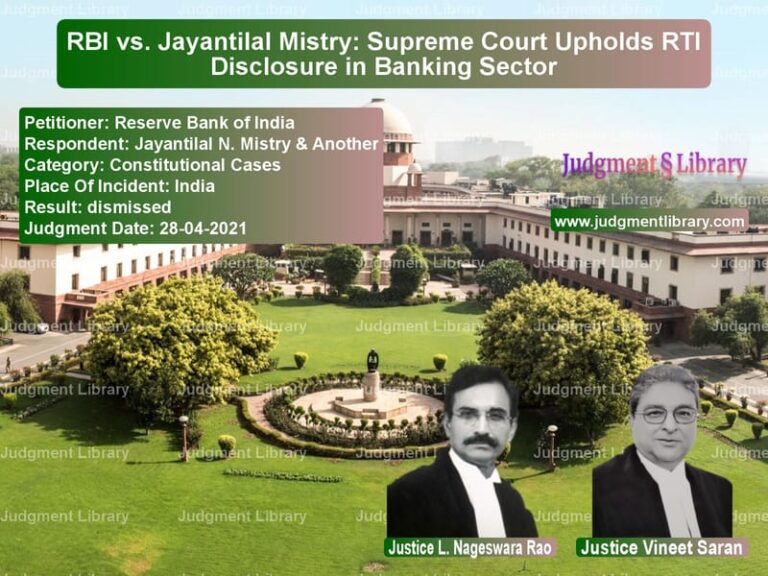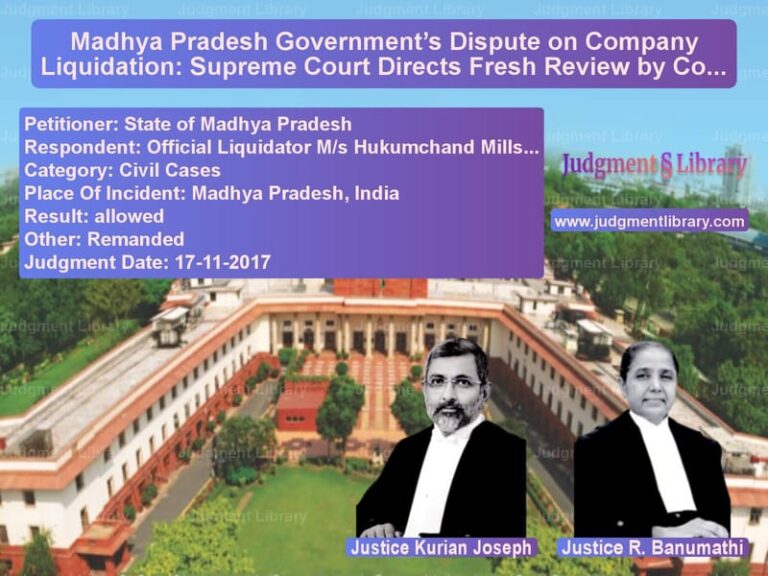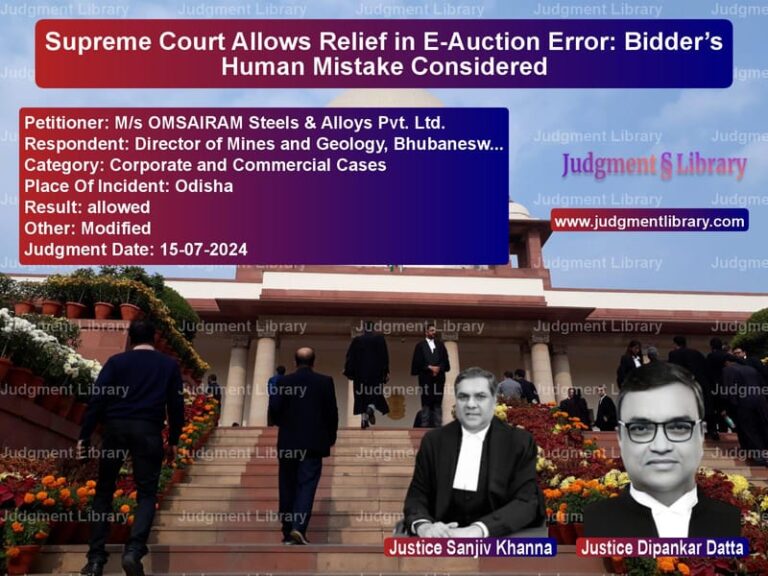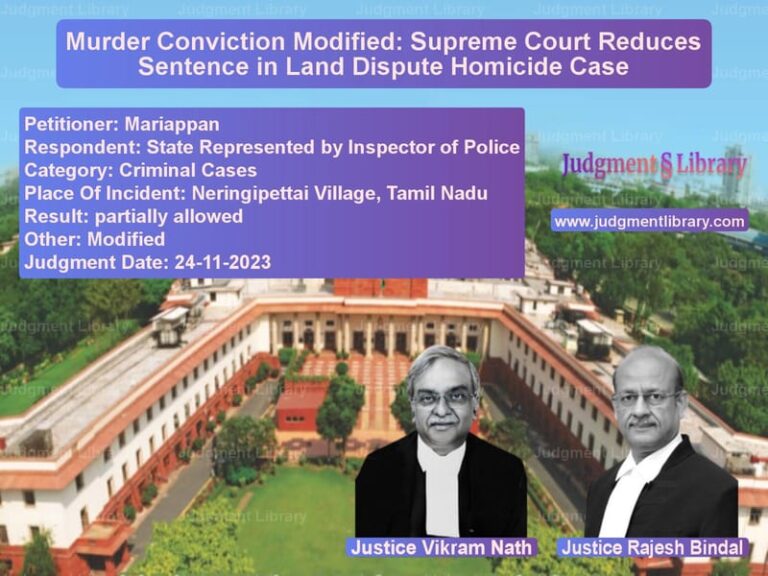Supreme Court Acquits Three Accused in Murder Case Due to Faulty Investigation
The case of Madhav vs. State of Madhya Pradesh revolved around a murder trial where the appellants, accused of killing a man named Pappu @ Nand Kishore, were convicted under Section 302 read with Section 34 of the IPC. The Supreme Court was called upon to assess whether the conviction was based on reliable evidence or if the investigation had been influenced by external factors.
Case Background
On May 13, 2008, at approximately 10:30 PM, a fatal attack took place in Sagar, Madhya Pradesh. The prosecution alleged that three accused persons—Raju Yadav (A-1), Sahodra Bai (A-2), and Madhav (A-3)—attacked Pappu @ Nand Kishore with a knife and lathis, leading to his death. Subsequently, Sahodra Bai (A-2) transported the victim to a hospital and reported to the police that two different individuals, Ruia and Kailash, had committed the crime.
The police initially registered an FIR against Ruia and Kailash based on A-2’s complaint. However, after a few days, the investigation changed course, and A-2, A-3, and A-1 were made the accused, while the original suspects were treated as witnesses. The trial court convicted all three accused and sentenced them to life imprisonment, a decision upheld by the Madhya Pradesh High Court.
Arguments by the Appellants
- The appellants contended that the entire investigation was manipulated due to political pressure.
- “The police initially charged Ruia and Kailash but later reversed their stance under political influence,” their counsel argued.
- There was no clear motive for A-1 to kill his own brother over a mere dispute of Rs. 250.
- The prosecution’s main witness, PW-9, only recorded her statement 21 days after the incident, raising doubts about its reliability.
- The forensic evidence failed to conclusively link the weapons allegedly seized from the accused with the crime.
Arguments by the Respondent (State of Madhya Pradesh)
- The State argued that multiple eyewitnesses, including PW-9, had testified against the accused.
- “The medical evidence clearly supports the prosecution’s case, confirming that the injuries match those caused by the recovered weapons,” the prosecution claimed.
- The trial court and High Court had correctly relied on the forensic reports that confirmed human blood on the seized weapons.
Supreme Court’s Observations
The Supreme Court carefully examined the following issues:
1. Was the investigation fair and unbiased?
- The Court found that the police initially booked Ruia and Kailash but later altered the charges against A-1, A-2, and A-3 due to external pressure.
- “A case should be built on facts, not on external influences or political considerations,” the judgment emphasized.
2. Were the forensic and eyewitness accounts reliable?
- While the forensic report confirmed the presence of human blood on the alleged murder weapons, it did not conclusively match the victim’s blood type.
- “A conviction cannot be sustained solely on the presence of human blood when the linkage to the deceased is unproven,” the Court noted.
- PW-9, the star witness, was only examined 21 days after the incident, which diminished the credibility of her testimony.
3. Was there any reasonable doubt regarding the guilt of the accused?
- The Court highlighted several inconsistencies in the prosecution’s case and the manner in which the investigation was conducted.
- “When two versions of an event exist, the benefit of doubt must go to the accused,” the judgment stated.
Supreme Court’s Judgment
The Supreme Court ruled:
- “The conviction and life sentence of the appellants are set aside.”
- “The appellants are acquitted of all charges and shall be released immediately.”
- “A flawed investigation cannot form the basis for convicting an accused beyond reasonable doubt.”
Conclusion
This judgment reaffirms the principle that criminal trials must be based on credible evidence, not manipulated investigations. The Court’s decision highlights the importance of protecting individuals from wrongful convictions due to external influences in criminal proceedings.
Petitioner Name: Madhav.Respondent Name: State of Madhya Pradesh.Judgment By: Justice Indira Banerjee, Justice V. Ramasubramanian.Place Of Incident: Sagar, Madhya Pradesh.Judgment Date: 18-08-2021.
Don’t miss out on the full details! Download the complete judgment in PDF format below and gain valuable insights instantly!
Download Judgment: madhav-vs-state-of-madhya-prad-supreme-court-of-india-judgment-dated-18-08-2021.pdf
Directly Download Judgment: Directly download this Judgment
See all petitions in Murder Cases
See all petitions in Attempt to Murder Cases
See all petitions in Custodial Deaths and Police Misconduct
See all petitions in Judgment by Indira Banerjee
See all petitions in Judgment by V. Ramasubramanian
See all petitions in allowed
See all petitions in Quashed
See all petitions in supreme court of India judgments August 2021
See all petitions in 2021 judgments
See all posts in Criminal Cases Category
See all allowed petitions in Criminal Cases Category
See all Dismissed petitions in Criminal Cases Category
See all partially allowed petitions in Criminal Cases Category


